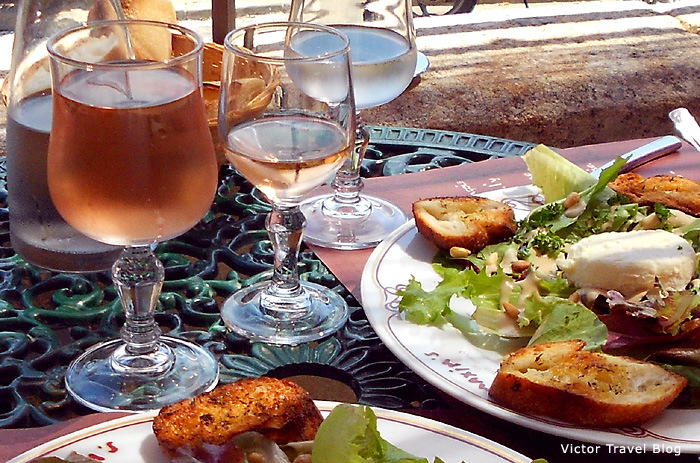“Edibles & Potables” is F&D’s Sunday slot for food and dining explorations outside our customary metro Louisville coverage area.
Across the ocean blue in Europa, there’s a reinvention underway.
At Noma, there’ll be “no mo” reindeer brain custard with bee pollen. CNN helpfully examines the world-renowned Copenhagen restaurant’s approaching end game.
Noma, one of the most feted restaurants in the world, is set to close its doors to diners next year. Since opening two decades ago, the Copenhagen restaurant – credited with the invention of New Nordic Cuisine – topped the list of the World’s 50 Best Restaurants five times, most recently in 2021.
But after years of serving dishes based on locally foraged ingredients – from reindeer brain custard with bee pollen to a quince and fermented rice ice cream with an oyster caramel – chef René Redzepi’s three-Michelin-star venture will bring its restaurant chapter to a close at the end of 2024. The following year it will be reborn as a “giant lab,” dubbed Noma 3.0.
“(It will be) a pioneering test kitchen dedicated to the work of food innovation and the development of new flavors, one that will share the fruits of our efforts more widely than ever before,” the restaurant said in a statement on its website.
At the New York Times, Frank Bruni duly considered Noma and the “Fizzle of Too-Fine Dining,” but a more interesting “opinion” submission to the newspaper followed shortly thereafter, as written by chef and restaurateur Vivian Howard.
Howard’s most important overarching point: “Extremist fine dining’s challenges are just the amuse-bouche in a multicourse menu of the rotting state of the restaurant business.”
Foodie Fever Dreams Can’t Keep Restaurants Afloat
A large part of the hospitality industry is ravaged, thanks to the pandemic and its fallout. Even spots that pivoted through the initial crisis were soon suffocated by labor shortages or a mucked-up supply chain. But restaurants were struggling with losses in staffing, momentum and revenue long before 2020. The pandemic merely made obvious the archaic and limited nature of our gerbil wheel of a business model.
Howard knows of which she writes, having recently closed Chef & the Farmer, her farm-to-table restaurant in Kinston, NC.
We did not bury, dehydrate or reconcentrate things in our kitchen, but everyone — even the interns — got paid. Even so, Chef & the Farmer closed, in large part because the inefficiencies, stress and fatigue brought by an unsustainable business model became impossible to ignore. Our industry needs to evolve or else more full-service, cuisine-driven restaurants like mine will languish their way to extinction.
The chef is candid in her assessment.
While guests sipped and savored their painstakingly created foodie fever dreams, the people behind the scenes got slammed — or, to apply some of the other words we used to describe our experience as we put together yours, we got crushed, pummeled and murdered.
Food margins are thin, restaurants depend on alcohol sales, guests pay servers through tipping, and salaried staff members usually are overworked to make up differences. What’s more, “it’s all but impossible to offer meaningful benefits like health insurance or paid leave.” Faced with the unsustainability of the full service restaurant model, operators like Howard invariably look to various less costly side hustles to make ends meet.
I bet at a certain point, after being anointed a creative genius by diners and journalists, your favorite magician decided to pull a burger joint, a taco shop or a fried chicken shack out of his or her toque.
Howard did it twice, first with a burger spot and then with a pizzeria, the idea being to subsidize the loss-leading “big” concept.
For us, any culturally appropriate concept would have done as long as it involved less service, labor, square footage — really less of everything than its demanding, insatiable money pit of a big sister. All we needed was volume. The goal was to make enough profit from burgers and pizza to ensure the future of the mother ship, Chef & the Farmer. That’s a lot of investment to try to make money off the original.
Her efforts were mostly successful, but the creation of “restaurant groups” brings problems of its own, including stretched resources and wavering morale.
What are the alternatives?
Raising prices to where they should be tends to drive away patrons. Lengthened hours of operation to serve breakfast or lunch? Okay, except that tipping recedes during those times of day, and accordingly, employees don’t embrace those shifts.
As for discounting, this may be Howard’s most pithy observation:
“When people have the opportunity to eat in your restaurant for a lower price, they often do. That tends to be enough to satisfy someone’s taste for a while.”
Howard’s conclusions will inform a future reopening of Chef & The Farmer, and can be summarized as “Make the most out of the least and don’t waste anything.”
We won’t rely on the diners to pay servers; the chefs will serve, cafeteria style, at our retrofitted kitchen bar. The energy we put into elevated service and its trappings will flow directly into the only “program” we have chosen to keep — our food. Most important, we will open to diners just four days a week, from 11 a.m. to 9 p.m., because that’s the kind of schedule that nurtures staff retention.
Moreover, she’ll deploy a lesson learned from Covid: “Next-level take-and-bakes, chef-prepared assemble-and-eats and pasta deliveries.”
We’ll be cooking for people whose butts are not in our dining room. Chefs who have graduated from nights on the line to quiet days in the kitchen will cook meals to stock the restaurant’s small collection of free-standing, strategically located smart fridges.
It’s not only Denmark and North Carolina. Obviously this grappling with unsustainable practices is happening in Louisville, too, and it worries me.
I have not conducted a scientific survey (at least yet) for this still youthful 2023, but apocryphally, it seems that local independent restaurants in metro Louisville are closing at a higher than usual rate, while each day brings another “new to market” (how I loathe this favorite phrase of “business for the sake of business” fetishists) chain or franchise eatery from somewhere else to here.
As for those “fevered foodie dreams” mentioned by Howard, allow me to close with a musical recommendation encompassing melodic Fever Dreams by British guitar legend Johnny Marr.




















